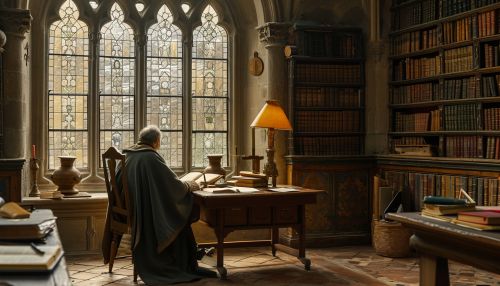Meister Eckhart
Early Life and Education
Meister Eckhart was born around 1260, in the small town of Hochheim, near Gotha, in the Landgraviate of Thuringia, in the Holy Roman Empire. His parents were of noble lineage, and they provided him with a comprehensive education. At a young age, he entered the Dominican Order, a religious order known for its commitment to intellectual pursuits.


He was sent to the University of Paris for his higher education, where he studied Theology and Philosophy. He was influenced by the works of Aristotle, Thomas Aquinas, and other prominent philosophers of the time. He also studied the mystical writings of Pseudo-Dionysius, which would later greatly influence his own mystical theology.
Career
Eckhart returned to Germany in 1294, after completing his studies in Paris. He held several administrative positions within the Dominican Order, including Prior of Erfurt and Vicar of Thuringia. In 1300, he was appointed Provincial of Saxony, a position that required him to oversee all the Dominican monasteries in that province.
In 1302, Eckhart was called to the Papal Court in Avignon. He was appointed Vicar General of Bohemia the following year. During his time in Bohemia, he founded a number of new Dominican convents.
Theological Contributions
Eckhart is best known for his contributions to Christian mysticism, particularly the development of the concept of the "Godhead". His teachings emphasized the unity of the soul with God, and the idea that the individual soul is, in essence, divine. This concept is often referred to as "the divine spark".
Eckhart's theology is characterized by a focus on the experiential and intuitive aspects of faith, rather than the intellectual or dogmatic. He believed that direct, personal experience of God was possible, and that this experience was the ultimate goal of the spiritual life.


Eckhart's teachings were controversial, and he was eventually accused of heresy by the Church. In 1326, a Papal Bull was issued, condemning several of his propositions. Despite this, Eckhart maintained his innocence until his death in 1328.
Legacy
Despite the controversy surrounding his teachings, Eckhart's influence on Christian mysticism and theology has been profound. His works have been widely studied and translated, and his ideas have influenced a number of other mystics and theologians, including John of the Cross, Julian of Norwich, and Thomas Merton.
Eckhart's teachings have also found resonance in non-Christian religious and philosophical traditions, such as Buddhism and Advaita Vedanta. His emphasis on the direct, experiential knowledge of the divine, and the unity of the individual soul with the divine, are themes that are found in many spiritual traditions.
